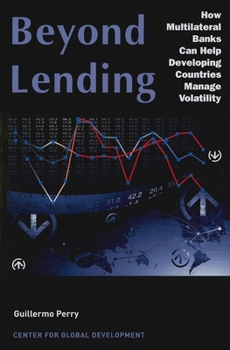Beyond Lending: How Multilateral Banks Can Help Developing Countries Manage Volatility
When he began this book in early 2008, Guillermo Perry argued that developing countries remained highly vulnerable to external risks such as commodity price declines, capital flow reversals, and natural disasters. The economic crisis that has since ensued confirmed Perrys analysis. It has also made his proposal more important than ever: multilateral development banks (MDBs) should move beyond lending to provide innovative risk-management tools for developing countries to manage volatility.
The risk that MDBs will fall into complacency as the short-term demand for traditional loans increases during the crisis should not deter innovations to ensure long-term stability. Contents 1. Causes and Consequences of High Volatility in Developing Countries 2. The Role of Financial Insurance and Hedging 3. Dealing with Liquidity Shocks and the Procyclicality of Private Capital Flows 4. Dealing with Currency Risks 5. Dealing with Commodity Price, Terms of Trade, and Output Risks 6. Dealing with Natural Disaster Risks 7. Why Multilateral Development Bank Practices Are So Far from Their Potential 8. An Agenda Going Forward
The risk that MDBs will fall into complacency as the short-term demand for traditional loans increases during the crisis should not deter innovations to ensure long-term stability. Contents 1. Causes and Consequences of High Volatility in Developing Countries 2. The Role of Financial Insurance and Hedging 3. Dealing with Liquidity Shocks and the Procyclicality of Private Capital Flows 4. Dealing with Currency Risks 5. Dealing with Commodity Price, Terms of Trade, and Output Risks 6. Dealing with Natural Disaster Risks 7. Why Multilateral Development Bank Practices Are So Far from Their Potential 8. An Agenda Going Forward
Format:Paperback
Language:English
ISBN:1933286326
ISBN13:9781933286327
Release Date:July 2009
Publisher:Center for Global Development
Length:98 Pages
Weight:0.45 lbs.
Dimensions:0.4" x 5.9" x 8.9"
Customer Reviews
0 rating





